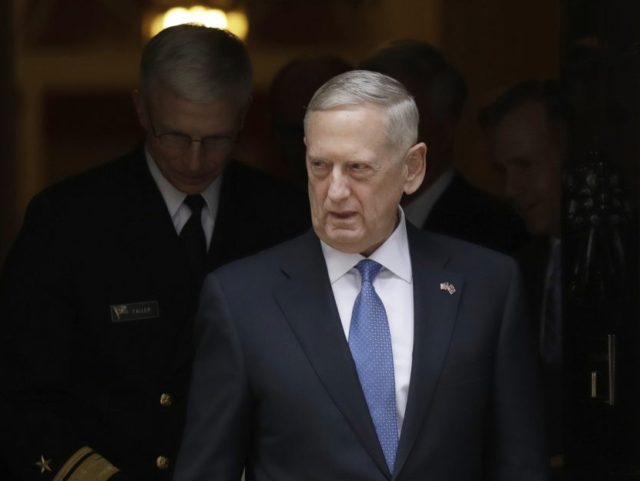WASHINGTON – Defense Secretary James Mattis said Tuesday that the U.S.’s military policy in Syria has not changed and defeating the Islamic State in Iraq an Syria remains the priority.
“Our military policy in Syria has not changed. Our priority remains the defeat of ISIS. ISIS represents a clear and present danger, an immediate threat to Europe and ultimately, a threat to the United States homeland,” he said at his first briefing as defense secretary.
The remark was aimed at abating public concerns that the recent U.S. strike against the Syrian regime, in response to an April 4 chemical weapons attack, would lead to a full-fledged war with Syria and its ally, Russia.
Mattis sought to explain the strike on Thursday – consisting of 59 cruise missiles launched at a Syrian regime airbase – as a “measured” and “singular” response to the chemical weapons attack – not the beginning of a new war.
“We determined that a measured military response could best deter the regime from doing this again,” he said. “The purpose of this attack was singular, against the chemical weapons use.”
“We addressed that militarily. But the rest of the campaign stays on track, exactly as it was before Assad’s violation,” he said. “It was not a harbinger of some change in our military campaign.”
Mattis said at the briefing:
There is a limit, I think, to what we can do. And when you look at what happened with this chemical attack, we knew that we could not stand passive on this.
But it was not a statement that we could enter full fledged, full bore into the most complex civil war probably raging on the planet at this time. So the intent was to stop the cycle of violence into an area that even in World War II, chemical weapons were not used on battlefields.
Even in the Korean War, they were not used on battlefields, since World War I; there’s been an international convention on this. And to stand idly by when that convention is violated, that is what we had to take action on urgently in our own vital interest.
Mattis also addressed lingering questions over whether the Syrian regime was actually responsible for the chemical weapons attack, which involved the nerve agent sarin and killed more than 80 and sickened dozens more.
“I have personally reviewed the intelligence, and there is no doubt the Syrian regime is responsible for the decision to attack and for the attack itself,” he said.
Russia has claimed that Syria dropped a munition on a rebel-owned chemical weapons facility, causing the spread of the weapons.
Mattis did not comment on reports that Russia may have known or participated in covering up the attack.
While Mattis sought to characterize the strike as limited, he also warned Syrian regime leader Bashar Assad against using chemical weapons again.
“The Syrian regime should think long and hard before it again acts so recklessly in violation of international law against the use of chemical weapons,” he warned.
Mattis did not clarify whether he meant the use of sarin or chlorine. Assad is believed to have used chlorine more frequently than sarin, and seeking to prevent chlorine use could lower the bar for U.S. intervention in Syria.
In response to a question as to how “prepared” U.S. forces are to take additional action against the regime, Gen. Joseph Votel, the commander of U.S. Central Command, who briefed alongside Mattis, said U.S. forces are able to carry out whatever order they are given by the defense secretary or the president.
“I would just say that as a Central Command commander, I’m very confident that we can respond to any directions or orders that the secretary or the president give us in the region,” he said.
He also said the focus on defeating ISIS “remains our primary mission.”
Mattis said about 20 aircraft – probably equating to about 20 percent of the Syrian regime’s air force – were taken out by the cruise missile strike.
Mattis and Votel did not comment on the status of a deconfliction line between U.S. and Russian forces used to avoid accidents in air space over Syria. Russia announced Friday it was cutting the line beginning Saturday morning.
“We maintain communications with the Russian military and with the diplomatic channels. It will not spiral out of control,” he said.

COMMENTS
Please let us know if you're having issues with commenting.